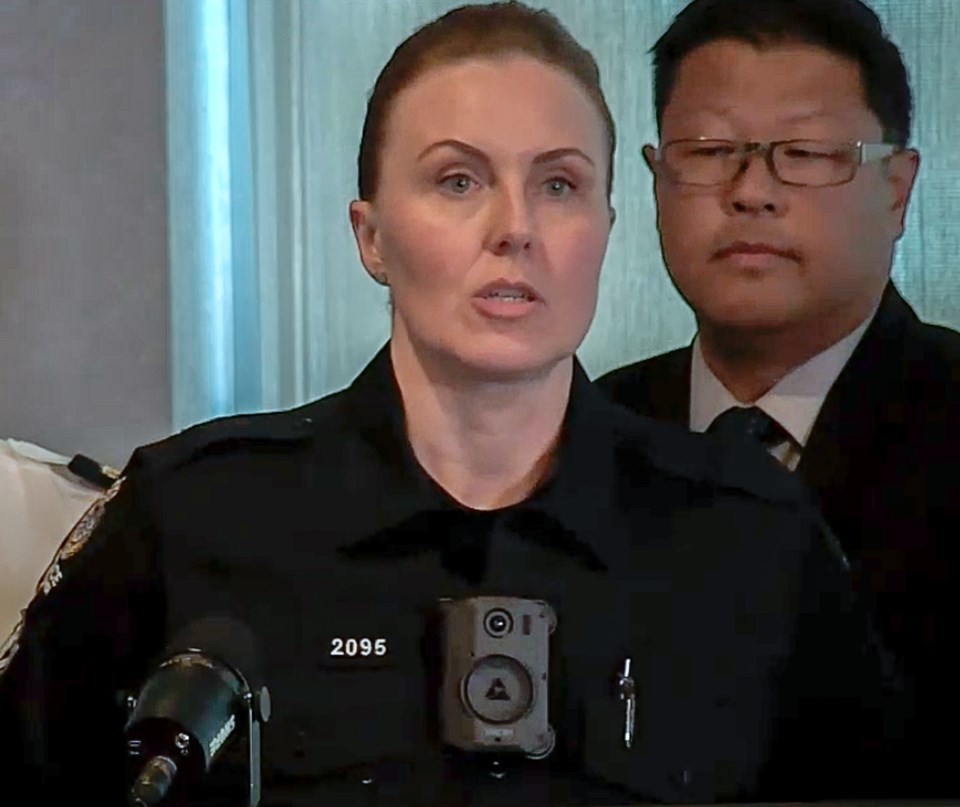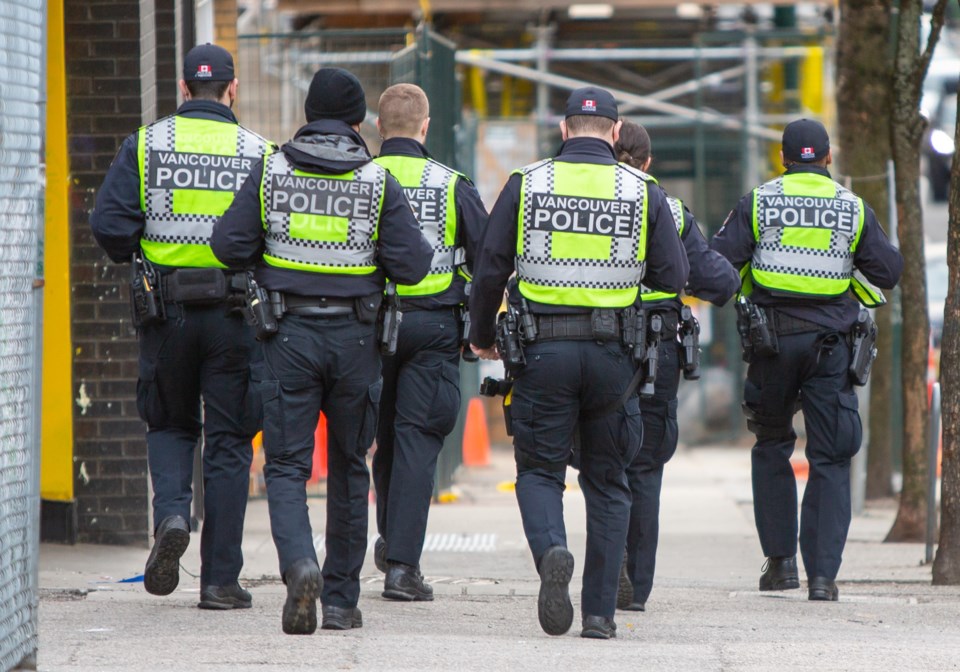The Vancouver Police Department’s plan to equip officers with body cameras in what was supposed to be a six-month trial beginning this fall has been delayed until January.
Sgt. Steve Addison, a media liaison officer, said in an email Monday that preparing for the launch has been “a significant endeavour” that has involved collecting community feedback, legal considerations, officer training and cost.
“We’ve spent months working with stakeholders, experts and community groups to establish guidelines and terms of references,” Addison said. “We’ve also engaged in extensive consultations throughout the community to obtain feedback and answer questions.”
As part of that feedback, the department was scheduled to host a virtual town hall meeting Dec. 11 from 6:30 p.m. to 7:30 p.m. to answer questions from citizens about the trial. People can participate by registering here and emailing questions to [email protected]
A VPD report that went before the Vancouver Police Board June 15 said a camera trial would be launched in the fall and run for approximately six months. The goal, at that time, was to equip 100 officers in patrol and the traffic section of the department.
Those officers will be working in the part of the city that includes the West End, downtown business district and Downtown Eastside. Only officers who volunteer to wear the cameras will be part of the experiment.
Motorcycle officers will be outfitted with cameras on their helmets.

$307,000 for trial
The VPD has requested city council cover the estimated $307,000 to run the trial. In December 2022, council committed $200,000 for the trial, which was anticipated at the time to begin this year.
Council is expected to vote on the city’s overall $2.15-billion budget Dec. 12. The requested $307,000 for the camera trial is part of the VPD’s $415.9 million operating budget request. The VPD has not disclosed how much a permanent camera program would cost.
The ABC Vancouver majority at city hall campaigned in 2022 on equipping officers with body cameras.
However, council cannot mandate officers to wear cameras; that is the jurisdiction of the police board.
Supt. Howard Tran told the police board in September that “if all goes well, full implementation can occur in 2025," depending on feedback from officers, the public and the board.
An evaluation report is expected to go before the board sometime in the last quarter of 2024, according to Victor Quan, the VPD’s staff project coordinator for the program.
“We will also measure the use of force by officers and the use of force directed to officers who are wearing the body worn cameras,” Quan told the board in September. “We will also measure the number of complaints against officers wearing these body worn cameras.”
Camera FAQs
As part of the program, the VPD has created a tab on its website where citizens can view guidelines governing the use of the cameras. A frequently-asked-questions section is also posted on the website.
Some examples of questions and answers include:
• Will a VPD officer tell me if I’m being filmed? “Yes, unless there is a safety risk in doing so.”
• Who can view the recordings? “Viewing the records is restricted to investigation or training purposes, and in accordance with the B.C. Provincial Policing Standards and VPD guidelines and policies.
Only the officer who took the footage and other designated staff with approval can view the video. The name of an employee, and the date and time, is automatically tracked for every person viewing the video.”
• I was recorded. How do I see the video? “Recordings will only be released in accordance with Part 2 or Part 3 criteria in the Freedom of Information and Protection of Privacy Act (FIPPA).”
The B.C. government now has standards for how police officers should use body cameras, but they don’t mandate their use. Delta Police Department has outfitted some of its officers with cameras.
The Delta force currently has 16 cameras, according to information posted on the department’s website, which said total cost of the purchase of the cameras and associated equipment was $18,000.
Approximately half of the cost was funded by a “police training and equipment grant” from the provincial civil forfeiture office.
Myles Gray
Earlier this year, a coroner’s jury into the death of Myles Gray, who died after an altercation with Vancouver officers in August 2015, recommended patrol officers begin to wear audio recording-capable cameras.
Vancouver Police Chief Adam Palmer told the board Sept. 21 that the recommendation didn’t prompt the VPD to consider cameras.
“This is actually something that VPD called for in 2021, it's something that the board and city council approved in 2022,” he said.
“The Myles Gray recommendations were only from about four months ago. They're long after the fact, and they do form a part of that but really, the nexus and all the work on this was done well before that inquest.”
Palmer is on record telling B.C.’s Special Committee on Reforming the Police Act that he supports the deployment of cameras as a tool to strengthen public trust and confidence in police.
'The video will likely be obscured'
In 2016, the Independent Investigations Office said in its annual report that it could have better resolved a significant number of cases in B.C., if officers were equipped with body cameras.
The report concluded that footage from cameras would have potentially assisted in 93 per cent of 71 investigations reviewed by the agency’s investigators.
Of the 71 cases reviewed, 49 involved general duty officers, 17 were related to dog handler teams and five concerned emergency response teams and the Combined Forces Special Enforcement Unit.
As far back as 2013, a Vancouver police report that went before the police board pointed to several benefits of having police wear cameras, including increased transparency.
“When an incident occurs and the facts of the case are disputed by police officers and suspects, the camera provides another set of facts which may aid in determining what actually occurred,” the report said.
“However, it is important to note that the value of [body cameras] in many use-of-force situations is limited due to the fact that in the case of a struggle, the video will likely be obscured.”
X/@Howellings





